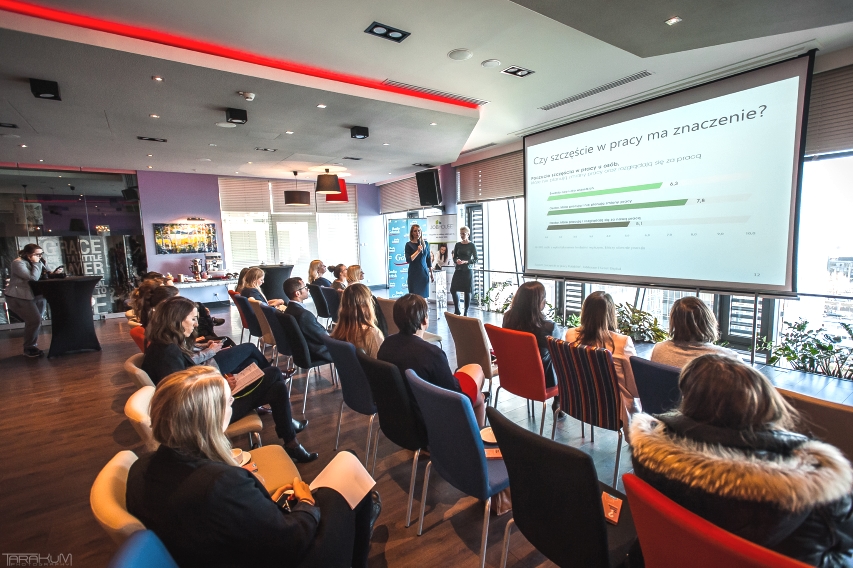We are talking about happiness at work with Natalia Bogdan, who is CEO in Jobhouse, a nationwide temporary work and personal consulting agency, and who conducted an unusual study. Its purpose was to analyse, whether Poles are happy at work, what the level of satisfaction depends on and to identify what should be changed to make Poles more willing to recommend their workplaces. The report was presented on November 21 in Olivia Business Centre.
The study was conducted on the sample of N=901 people with secondary and higher education, who are currently working, mostly in big cities. The study was conducted from 12.06.2017 to 31.08.2017 through an online survey on behalf of Jobhouse by Great Digital agency.
–/ —
Monika Bogdanowicz (Olivia Business Centre): Why is it worth analysing the subject of happiness at work, who needs this knowledge, especially nowadays?
Natalia Bogdan: I think that everyone needs it. I believe that happiness or its absence at work translate into other areas of life. I don’t think that someone who is not satisfied with the direction his/her career is taking or has a boss, who clips his wings, can be kind to his/her close ones and full of energy to act.
MB: Are we currently on such a level of labour market development that our emotions and feelings connected with company’s organisational culture are starting to play bigger and bigger role?
NB: Yes, definitely. More and more people pay attention not only to material aspects of their work. In the past, the main, and very often the only driver at work, was money. Of course, nowadays it is also important – salary makes it possible for us to live, but more and more people also want their work to give them opportunities for development, meeting interesting people and pursuing their passions. As shown in our study called “The happiness of Poles at work”, we care more and more about keeping balance between work and private life.
MB: What can we find out from the report prepared by your company?
NB: That Poles, on a scale from 0 to 10, are happy at work on the level of 6.3. This is a satisfying result, but we still have some scope for improvement. This result varies significantly between people who work and aren’t planning to change their jobs (they ranked their level of happiness at 7.8) and the ones who work, but are thinking of changing their jobs (they ranked their level of happiness at 5.1). This is an important signal for employers that nowadays we don’t have to be extremely unhappy at work to start looking for a new job.
We also identified the factors, on which the level of happiness at work depends. For 88% of employees, a factor which determines happiness at work is a good salary. Such factors as co-workers, who we can count on – 84% and development opportunities at work – 81% also ranked very high. Other factors were connected with work-life-balance – 80% of respondents indicated the possibility to balance work and private life, while 76% of respondents mentioned quite a surprising factor, namely commuting time.

MB: What are the main conclusions and recommendations both for people who are looking for attractive companies and for companies which want to convince them that their job offers are of high quality?
NB: Employees should, most importantly, think about what determines their job satisfaction and think which tasks and companies can give it to them. Only on this basis we should start looking for a job. On the other hand, employers should analyse what employees indicate as important factors at workplace and adapt their offer to market’s needs, as well as present it in a proper way in their communication with candidates.
MB: How can we distinguish in your report semantic usage of such terms as: satisfaction, level of satisfaction and happiness, which are customarily used during the analysis of the subject in HR environment.
NB: We entitled our report “The happiness of Poles at work”. Of course, there are many definitions of happiness and the feeling of happiness is very subjective. That is why, we didn’t create an unequivocal definition of this term in our study. We wanted respondents to assess on their own their level of happiness and what it means to them.
MB: Is a workplace itself important for employees, where it is placed, what its aesthetics and interior design are, as well as the quality of space outside the office, for example whether there is some place to have a rest?
NB: 48% of respondents answered that comfortable working conditions at the office help people be happy at work. 25% of respondents answered that conditions in their office would have to change to make them willing to recommend their workplace. However, we didn’t define what respondents understand as comfortable working conditions.
MB: What, in your opinion, primarily influences the fact that a given company is/may be perceived as an example of good practices in the scope of shaping work environment, which may contribute to the happiness of its employees?
NB: I think that the most important for a company is to take care of both tangible and intangible needs of its employees. Apart from salary, which makes it possible to live a decent life, companies should take care of employees’ development opportunities, atmosphere in a team and balance between work and private life.

MB: How each of us could answer the question whether we can measure the level of happiness, which, after all, predestines our decisions and conscious choices made in the situation of choice or the will to change our job?
NB: While creating the study entitled “The happiness of Poles at work” we wanted to encourage Polish employees to think of their own happiness at work. I think that each of us should think whether our job gives us satisfaction and opportunities to fulfil our needs, not only tangible ones. If there are areas, in which we don’t feel a true satisfaction, it is worth wondering, what we can influence ourselves and what can we suggest to our boss.
MB: Which issue surprised you in this study and are you planning to further explore the subject of happiness at work?
NB: What surprised me the most was the fact that Poles are not willing to recommend their workplaces. To study this parameter, we used Net Promoter Score (NPS) indicator, which shows the ratio of critics to promotors. The result of Poles on a scale from -100 to 100 was only -14. For comparison, NPS used in consumer tests of such brands as Harley-Davidson or Apple is more than 70.
MB: Are you planning the next editions of the study?
NB: Yes, we have received a lot of positive feedback on the study both from employees and employers. We are planning to repeat it every year to observe how Poles’ level of happiness changes and whether factors, on which it depends, change. During meetings with employers, employees and media, during which we discussed the results of the study, we got a lot of valuable tips concerning additional directions, in which we could develop our study.

MB: Thank you for the interview.
HERE YOU CAN DOWNLOAD “HAPPINESS AT WORK” REPORT
–/ —
Natalia Bogdan is a founder of Jobhouse recruitment agency, headhunter, career advisor and a labour market expert. She completed Human Resource Management and Labour Law degree courses at the University of Gdańsk, as well as Human Resources Management degree course at Instituto Politecnico do Porto and Strategic Leadership Academy degree course at Ican Institute. Currently, she is a lecturer at Kozminski University in the field of Recruitment and Selection. She has been working in HR sector for more than 12 years. She gained her experience in Great Britain, in the USA, the Netherlands and Portugal. In 2017, she was honoured with title of the Businesswoman of the Year in a competition organised by Olga Kozierowska and Sukces Pisany Szminką. Apart from work, she is interested in healthy lifestyle – she has finished over a dozen marathons, half marathons and triathlons and currently she is preparing for Kilimanjaro expedition. She loves sport, travelling and healthy eating.




